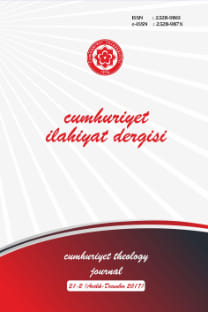Mehmed Fazlullah es-Sivâsî’nin el-İtidâl fî Muhabbeti’l-Âl Adlı Mesnevîsi
Mehmed Fazlullâh Es-Sivâsî, Türk siyâsî ve ictimâî tarihi açısından önemli olduğu kadar Türk Edebiyatı tarihi açısından da önemli bir isimdir. Osmanlı’nın son dönemlerini ve Cumhuriyet’in ilk yıllarını idrak eden Mehmed Fazlullâh, Türkiye’nin farklı şehirlerinde öğretmenlik mesleğini icra etmiş, memleketin necat bulmasında önemli kararların alındığı Erzurum Kongresine Sivas delegesi olarak katılmış önemli bir zattır. Onun, bu özelliklerinin yanısıra edebî kişiliği de ön plandadır. Kaleme almış olduğu eserler vesilesi ile Divan Edebiyatının son müellifleri arasında yer almıştır. Birçok eser kaleme alarak velûd bir müellif olduğunu göstermiştir. Bu eserlerden biri, Hz. Peygamber’in ehl-i beytine duyulan sevginin dile getirildiği El-İtidal fî-Muhabbetü’l-âl adlı eserdir. Bu makalede mezkûr eser tanıtılarak eserin tam metni ilim âlemine sunulacaktır.
Mahmad Fadlullah al-Sivāsī's Mathnawi Named al-Itidāl fī-Mohabbati'l-Āl
ABSTRACT: Mahmad Fadlallah al-Sivāsī as well as important in terms of political and social history of Turkey, he is also is an important person for Turkish literature. Realizing the late Ottoman period and the first years of the republic, Mahmad Fadlullāh, is a momentous person who taught in many different cities of Turkey and participateded in Erzurum Congress -where there have been made decisions for development and prosperity of the country-as delegate of Sivas. That the literary personality of these features, as well as the foreground. By the pieces he indited he took part in the last authors of Divan Literature. Wrote many pieces, he has shown that he is a prolific author. One of these works al-Itidal fī-Mohabbati'l-Āl which expresses the love to ahl al-beyt. In this article, the aforementioned work will be presented to the realm of science by introducing full text of the work.SUMMARY: Mahmad Fadlallah al-Sivāsī is an important figure in Turkish literature as well as being an important person in terms of political and social history of Turkey. He was an important person, who experienced the late period of Ottoman Empire and the first years of Turkish Republic, worked as a teacher in several cities of Turkey and joined to Erzurum Congress as a Sivas delegate in which some important decisions for the salvation of the country were taken. Besides his historical personality, his literary personality also comes to the fore. The author who was among the latest representatives of Divan Literature with the works he wrote proved himself as a prolific author by writing lots of works. al-Itidal fī-Mohabbati'l-Āl, in which the necessity of moderation in the love to Ahl al-Bayt was expressed, is one of his first works. This work which is composed of 535 couplets is the longest one among his existing works. Published in 1911 in Aleppo, the work comprises two parts as introduction and the main body where the basic subject was handled. In the introduction part bearing the title “Ifade-i Meram”, Mahmad Reshad V. who was the 35th Sultan of Ottoman Empire and the 114th caliph of Islam was highly praised. That Sultan Mahmad Reshad ruled the country in justice and protected Islam was mentioned and it was noted that the Sultan must be prayed for his qualities in this part. After the Introduction comes the part, in which the main topic is dealt, with Basmala (The name of Allah). This part begins with a couplet expressing thank to Allah and praising his lover Prophet Mohammad (PBU). al-Itidal fī-Mohabbati'l-Āl is based on the concepts “tawalla” (Loving Ahl-al Bayt and those who love them) and “tabarra” (Not loving those who do not love Ahl-al Bayt). On the other hand, he noted that the same love and respect for Ahl-al Bayt must be shown to the companions of the Prophet without exception, saying they were not different from the members of Ahl-al Bayt. Here, the author mostly mentions about Muawiya b. Abu Sufyan – prophet Momammad’s (PBU) brother-in-law- and highly praises his qualities. The event in which Hussain and his followers who did not obey Yezid b. Muawiya were made martyr is one of the saddest events in history of Islam. That event causing an untreatable wound in the hearts of Muslims has mostly been handled in the works of Turkish Literature either as a part or in a way to be a subject by itself in individual works. Mahmad Fadlallah dealt Karbala Event in this work as well. Besides noting that he was quite overwhelmed by sorrow when the name of Hussain passed, he also cursed those who were responsible for this upsetting event for their being deprived of Allah’s forgiveness and mercy. The work ends with giving such several advices to readers as Ahl-al Bayt and the companions of the Prophet must always be remembered with respect and appreciation, hatred should be felt for the sake of Allah, and the the love for Ahl-al Bayt ought to be in moderation. In this article, the mahtnawi named al-Itidal fī-Mohabbati'l-Āl by Mahmad Fadlallah al-Sivāsī is unveiled and the full text of the work is presented.
___
Arslanoğlu, İbrahim. Sivas Meşhurları. Sivas: Sivas Valiliği İl Kültür ve Turizm Müdürlüğü, 2006.
Aşkun, Vehbi Cem. Sivas Şairleri. Sivas: Sivas Halk Evi Yayını, 1948.
Erdoğan, Mehtap. “Tevfik Fikret’in Tarih-i Kadîm’ine Mehmed Fazlullah’ın Reddiyesi: Şihâbü’l-kudret fî Recmi’l-Fikret”. Turkish Studies, İnternational Periodical For The Languages, Literature and History of Turkish or Turkic 5/1 (2010): 974-1006.
Günaydın, A. Necip. Erzurum Kongresine Katılan Sivas Vilayeti Delegeleri. Sivas: Cumhuriyet Üniversitesi Atatürk Araştırma ve Uygulama Merkezi, 2002.
İnal, İbnülemin Mahmut Kemal. Son Asır Türk Şairleri. İstanbul: Dergâh Yayınları, 1988.
Jumaa Qadir, Mohameed. “Şeyh Rızâ Talebânî’nin Türkçe Şiirleri”. Yüksek Lisans tezi, Selçuk Üniversitesi, 2013.
Olcaytu, İbrahim. Folklor Defteri II (1907-1945). (Hazırlayan: Sadık Perinçek). Ankara: Kalan Yayınları, 2001.
Yıldırım, Yusuf. “Fazlullah Moral’ın Münâcât-ı Bedîa Adlı Eseri”. Cumhuriyet Üniversitesi İlahiyat Fakültesi Dergisi 19, sy. 2 (15 Aralık 2015): 81-110.
Yıldız, Âlim. Sivaslı Şairler Antolojisi. İstanbul: Sivaslılar Vakfı, 2003.
Yıldız, Âlim. “Fazlullah Moral’ın İki Mesnevîsi: Taziye-nâme ve Vefât-ı Nebi”. Recep Tayyip Erdoğan Üniversitesi İlahiyat Fakültesi Dergisi 8 (2005): 25-42.
Yılmaz, Mehmet. Dört Halifeden Vecizeler Sözlüğü. İstanbul: Şule Yayınları, 2003.
http://lisanifarisi.net/category/molla-camiden-5/ (Erişim: 04.04.2016).
